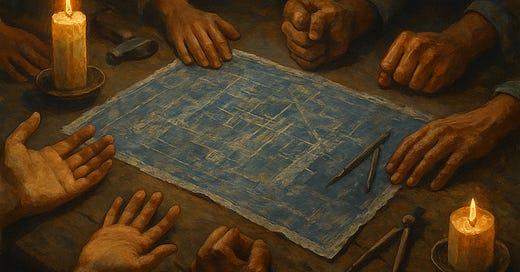Day 12: The Reckoning Is Ours
How the One Big Beautiful Bill turned exposure into a weapon—if we’re willing to wield it
“The test of a free society is not whether its people are angry when harmed—but whether they are brave when others are.”
— adapted from Rabbi Jonathan Sacks
If you are holding this book—if you have gotten this far—it’s because you care. And care is not passive. It is not quiet. It is not a gesture. Care means attention. Care means responsibility. You care about your family, your community, your country—even if you were not the one harmed. You care that others were. You care that representative government means members must answer to the people of their district, not the dictates of a would-be king. You care that democracy makes promises—not just of liberty, but of dignity, safety, fairness, and hope. And you care that those promises have been deliberately betrayed. That’s not politics. That’s not unfortunate. That’s not okay.
That care must be made visible. That sorrow must become resolve. That instinct to help must be made real.
The only way to do that is to act. Not tomorrow. Not eventually. But in motion, with clarity, every day. That is what holds back the tide. That is what builds the ground beneath the next step.
There are many ways to respond to betrayal. Anger. Defiance. Sabotage. Despair. Apathy. There are many ways to respond to misfortune, especially when it falls on someone else. Indifference. Gratitude. Glee. There are many ways to respond when someone else gets a benefit you were denied. Resentment. Spite. Resignation. But none of these change what happens next. Only action does.
What follows in this book are not commands. The appendices are not sacred text. They are not a rulebook. They are not enough. They may be wrong. They are certainly incomplete. But they are not here to be right. They are here to begin. They are meant to make the next move easier. More focused. Less alone. They are meant to be used.
Because what we do next cannot be reaction alone. It must be strategy. The Republicans who passed the Official Big Beautiful Bill did not hide their intent. They delayed it. They moved the worst parts to 2027—not to lessen the impact, but to shift the blame. They wanted to pass the bill, let the damage unfold, and then pretend it wasn’t their vote that made it happen. But now they are exposed. And now there is still time.
Some of what they passed can be stopped. Some can be reversed. And even what cannot be undone can still be mitigated, answered, and replaced. But only if Congress changes. And not slightly. Not eventually. Now.
The path is narrow. The numbers are steep. But the math is real. With 270 in the House and 60 in the Senate, the worst of what was passed can still be blocked. But even short of that, dozens of provisions can be reversed with majorities. Others can be investigated, delayed, tied up, and made visible. The more seats change, the more levers are restored. And every seat is vulnerable.
That’s where the work begins. First, by confronting current Republican members. The ones who voted for this. The ones who stayed silent. The ones who acted out of fear. Their silence must be named. Their loyalty must be questioned. Their choices must be remembered. Every vote they cast from now through November 2026 should be seen through the lens of what they already chose to do.
Second, by challenging them in their own primaries. Some believe they are now protected. That Trump will not send a challenger. But that does not mean they cannot be replaced. Their cowardice can be opposed from within their party. New candidates can rise to say: you were supposed to represent us. You didn’t.
Third, by building a full slate of Democratic challengers. Even in red districts. Especially in red districts. There are no safe seats anymore. And there is no excuse for ceding ground. The damage of this bill is not theoretical. It is arriving in schools, clinics, grocery bills, disaster zones, and small-town budgets. A good candidate doesn’t have to explain that. They only have to name it.
Fourth, by demanding strategy from Democratic leadership. This is not a moment for branding. It is a moment for alignment, for clarity, for coherence. Democrats must stop campaigning like they are explaining themselves to the press. They must start campaigning like they are explaining betrayal to the people who lived through it.
Fifth, by helping voters make the connection. Because propaganda is loud. And pain is quiet. The job now is to help people see the harm—not as an act of God, or inflation, or fate. But as the product of a vote. A vote their representative cast. A vote that can be reversed.
There is no single right way to act. There is only movement. Only memory. Only the refusal to look away.
What happens next is not fixed. What gets worse is not fate. And what was broken can still be made whole. But it will not happen by waiting. It will not happen by hoping someone else will act. It happens only by showing up—with strategy, with discipline, with care. Every day. Until betrayal becomes recovery.





